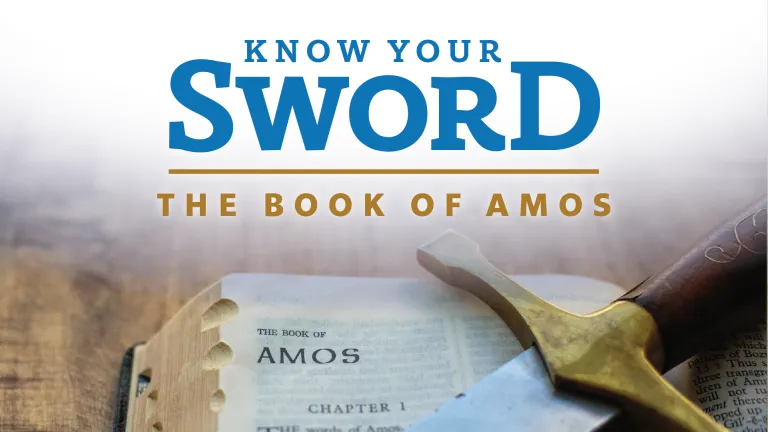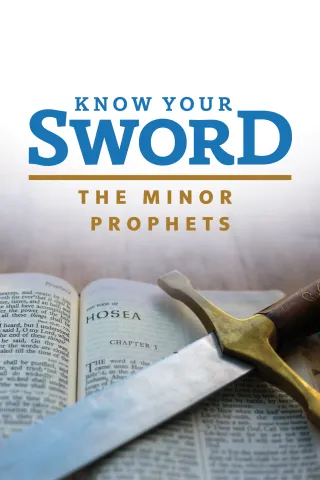Amos Part 05

Amos 6 contains warnings to those who don’t think that the words of the prophets apply to them. Amos 7 begins the third part of the book, and Amos is given three prophetic visions: one of locusts, one of fire and one of plumb line.
Amos 6 opens with a sharp warning: “Woe to you who are at ease in Zion, and trust in Mount Samaria.” The Israelites vainly trusted in their fortifications at Samaria and their false religion. Since “Zion” often refers to spiritual Israel (the Church), this may be a dual prophecy. In either case, we are reminded that we cannot be at ease and think we are safe just because we don’t sense danger (see Jeremiah 7).
In verse 2, the prophet points to distant cities—Calneh on the Tigris, Hamath in Syria and Gath of the Philistines—suggesting that if these once-great cities could be conquered and punished, so too could Israel. Verses 3–6 describe symbols of luxury and excess like “beds of ivory,” “couches,” and “instruments of music,” likely referencing partying rather than praise to God as David once did. The mention of drinking “wine from bowls” indicates excessive indulgence. Yet despite this abundance, the people were “not grieved for the affliction,” showing a heartless indifference to oppression. As Ezekiel 9:1–6 warns, God’s people should “sigh and cry” over the sins of the land.
In verses 7–8, God declares that Israel will go into captivity first. When God says, “the Lord God has sworn by Himself,” it makes the judgment irrevocable (Hebrews 6:13). Verses 9–10 describe a scene of death so widespread that when someone comes to bury a relative, he is told to “Hold your tongue! For we dare not mention the name of the LORD.” perhaps meaning, “don’t praise God in thanks, because you will soon die too.” The use of cremation, which was rare in that culture, may suggest an effort to stop contagion or prevent the desecration of corpses. Verse 11 mentions the “great house” and the “little house,” which could perhaps be referring to Israel and Judah, or just showing that both great and small would be punished alike.
Next, a rhetorical question highlights how pointless and destructive their current way of life is—just as horses cannot run on rocks, so Israel’s lifestyle could not bring blessings (verse 12). Verse 13 references Lo Debar, meaning “nothing,” and Karnaim, meaning “horns,” or power. Meaning that the recent rise of Israel under Jeroboam II was as empty as trying to plow on rock. In verse 14, God declares He will “raise up a nation,” seemingly referring to Assyria, that will conquer from Hamath in the north to the Arabah in the south. In other words, all would be conquered
Amos 7 marks the beginning of the third part of the book, where Amos receives three visions from God. The first vision (7:1–3) involves locusts. The “king’s mowings” likely refer to a tax taken before the people could harvest, meaning any later destruction would directly harm the people. The locusts may symbolize enemy nations of Israel (Joel 1:4), but the reference to crops suggests literal locusts. In response to Amos’s plea, “The LORD relented,” the Hebrew naacham, meaning He changed His mind, and the threat was revoked. God hears the prayer of the righteous.
The second vision (7:4–6) is of fire, possibly strong enough to dry up groundwater which would render the land uninhabitable. While fire often symbolizes war, God did bring actual war to Israel. Yet again, at Amos’s request, God relents. These visions show that God did not want to destroy Israel, He sought repentance.
The third vision (7:7–9) is of a plumb line, a basic builder’s tool used to measure vertical accuracy. It symbolizes God’s law as a standard of virtue. Israel did not “measure up,” and so, like a crooked wall, had to be torn down. Israel’s ruling dynasty, the House of Jeroboam, would fall. Jehu was promised that his family would rule for four generations, Jeroboam II was the third, and his son Zechariah reigned only six months (2 Kings 15:8–12).
In verses 10–13, Amaziah, the false priest at Bethel, is outraged at Amos’s message and deliberately twists his words. Amos never said Jeroboam himself would die by the sword, only that God would come against Jeroboam’s house. Nevertheless, Amaziah tells Amos to stop prophesying and to leave. This may mirror what could happen to us, as it did to the apostles. Hopefully, like Peter, we will say, “We ought to obey God rather than men” (Acts 5:28–29). It’s significant that Amos did not back down.
In verses 14–17, Amos responds by explaining his humble background—he was neither a prophet nor “a son of a prophet,” meaning he wasn’t trained in a prophetic school, (1 Samuel 19:24; 2 Kings 4:38; 6:1–3) but he was sent by God! Then, spontaneously, Amos pronounces judgment on Amaziah and his family and confirms that Israel will certainly go into captivity. He also uses the term “House of Isaac,” a phrase not used elsewhere in prophecy, emphasizing the gravity and uniqueness of this declaration.
Minor Prophets class is taught at ABC by Dr. Frank Dunkle.
UYA Team | uya@ucg.org
United Young Adults (UYA) primarily serves the 18–32-year age group for the United Church of God. There are three main areas of contribution to the lives of the young adults: Promoting Spiritual Growth, Developing Meaningful Relationships and Making the Most of Your Talents. The Know Your Sword series is a daily expository message introducing God’s Word from a trusted perspective.


